Country news
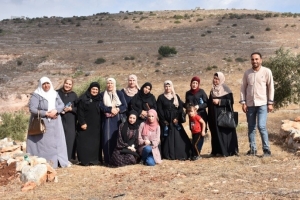
FAO organizes an exchange field visit to observe applied in-situ water harvesting techniques in Palestine - October 2022
The Food and Agriculture Organization of the United Nations (FAO) organized an exchange field visit which aimed to increase the participants’ capacity and knowledge about the in-situ water harvesting techniques regarding its design, construction, data monitoring and data collection process to observe the In-situ water harvesting techniques that have been implemented there.
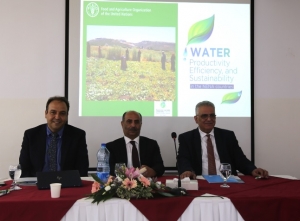
FAO holds final workshop for Palestine water project with Agriculture Ministry, Water Authority - August 2022
The Food and Agriculture Organization of the United Nations (FAO) on 31 August held a closing workshop under the Palestine component of the regional project “Implementing the 2030 Agenda for Water Efficiency/Productivity and Water Sustainability in Near East and North Africa Countries,” funded by Sweden.
The closing workshop brought together government representatives with other key local players to review the five-year project’s findings and results, agree on an action plan for institutionalizing sustainable water practices and initiate collaboration among attendees to realize the action plan.
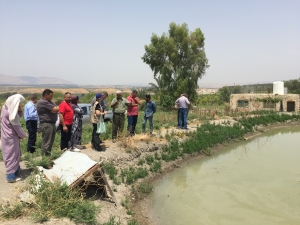
FAO evaluates Farmer Field Schools in Jordan and Palestine under the Water Efficiency, Productivity and Sustainability project - May 2022
The Food and Agriculture Organization of the United Nations organized an evaluation mission from 25 to 29 May 2022, for the Farmer Field Schools (FFS) implemented in Jordan and Palestine under the Water Efficiency, Productivity and Sustainability regional project (WEPS-NENA). The main objective of the mission was to evaluate the implementation of the FFS in Jordan and Palestine in terms of achievements, application of FAO’s FFS approach, steps, exercises and reporting, as well as identification of challenges and lessons learnt.
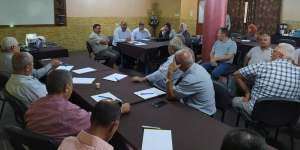
40 farmers and extension agents attend an avocado farmer Field School workshop in Qalqilya, Palestine - June 2022
The Food and Agriculture Organization of the United Nations (FAO) organized a Farmer Field School (FFS) workshop on the fifth of June 2022 in Qalqilya, Palestine with the main objective of presenting the results of the two avocado FFS’s implemented in Falamya and Qalqilya, Palestine. The workshop was attended by 40 participants including avocado farmers and extension agents from the Ministry of Agriculture.
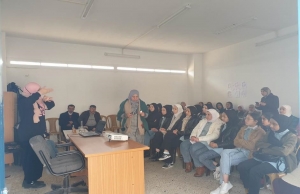
FAO raises students awareness on the importance of combating water waste and using water sustainably through #EveryDropCounts campaign - March 2022
The Food and Agriculture Organization of the United Nations (FAO) in collaboration with the Ministry of Agriculture and the Water Authority have implemented two awareness sessions in Palestine; one in a high school in Qalqilya governorate targeting 50 students aged 14, and one in Najah National University in Nablus governorate, targeting 40 university students. The main objective of the sessions was to spread the #EveryDropCounts campaign message, which tackles three main themes: Water is life. Water is food. Water is your responsibility.
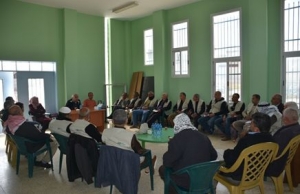
Improving farmers' water harvesting techniques for rain-fed olive orchards in Palestine - March 2022
The Food and Agriculture Organization of the United Nations (FAO), Ministry of Agriculture (MoA), and the Applied Research Institute of Jerusalem (ARIJ) conducted a three-day training from 27 February to 1 March to improve the technique of Palestinian olive farmers to harvest water and to impart good agricultural practices, attended by 84 olive farmers and extension agents in the villages of Tayaseer, Faqu'a, and Tammoun in the West Bank.
Also available in ARABIC.
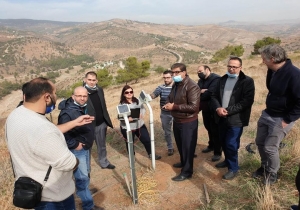
Expanding the potential of olive orchard water productivity through knowledge sharing on tailored micro water harvesting design and monitoring - December 2021
FAO - the International Center for Agricultural Research the Dry Areas (ICARDA) and Jordan's National Agricultural Research Center (NARC) hosted a training of trainers event to share experiences with Palestinian experts in olive orchard agriculture. The training took place on December 13 to 16, 2021, at the NARC headquarters in Jordan, and gathered 12 participants with the trainers. Seven Palestinian representatives from agricultural research and governmental institutions worked along three experts from Jordan. The focus was on demonstrating tailored in situ water harvesting solutions that simultaneously enhance yield and strengthen the entire agro-ecosystem's resilience to degradation and climate change effects, and learning the installation of soil moisture sensing equipment, monitoring procedure and data interpretation.
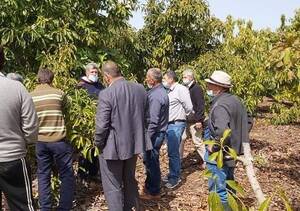
Farmer Field Schools contribute to improving Avocado production in Qalqilya Governorate, Palestine - April 2021
Farmer Field Schools (FFS) have been used as a way to enhance local farming techniques through targeted capacity development activities delivered in the form of on-the-job training to Palestinian farmers. The Food and Agriculture Organization of the United Nations (FAO), under the regional project “Implementing the 2030 Agenda for water efficiency/productivity and water sustainability in NENA countries”, in collaboration with the Palestinian Ministry of Agriculture (MoA) and the Qalqilya Agricultural Directorate, began preparations to launch two avocado FFSs in Qalqilya Governorate, one in the north (Jayyus-Falamya district) and one in the south (Qalqilya-Habla district), which by February 2021 were active. Trainings are delivered to groups of 15 to 20 farmers and focus on imparting good agricultural practices related mainly to water usage, modern crop management methods, reduction of chemical pesticides and proper disease and pest control, resulting in decreased input costs and increased economic return and resilience of farmers, and enhanced water productivity per drop.
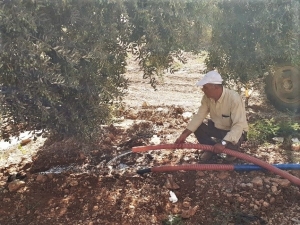
Transforming the management of resources in olive production through Farmer Field Schools in the West Bank, Palestine - March 2021
Olive cultivation is considered one of the most fundamental aspects of the Palestinian identity and culture. The quality of Palestinian olive oil keeps it of vital importance to the economy and the people, supporting the livelihoods of approximately 100 000 families, and employing thousands of people to extract over 19 metric tons of olive oil and over 87 metric tons of pressed olives. In Aqaba, Tubas Governorate, a representative reflection of the importance of olives is witnessed. Like many Palestinians, Elayyan Abu Arra is a farmer in his sixties who relies on olive cultivation as his main source of income to support himself and his family of ten people.
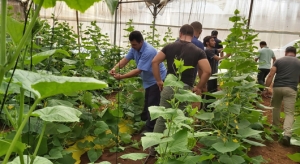
Prospering the potential of cucumber cultivation by participation in knowledge sharing through Farmer Field Schools in Palestine.
Living in in A’aba village that lies on the west of Jenin, Palestine, Basem is the breadwinner for his wife and four children, out of which two are university students. Like the rest of Palestinians, Basem and the rest of the farmers in his community struggle with the high cost of irrigation water threatening the continuation of their farming practices despite the availability of land and fertile soil.
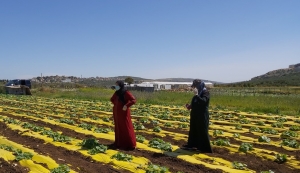
Women’s Farmer Field School’s success in Diarb Balout, Palestine
Under the framework of the regional project “Implementing the 2030 Agenda for water efficiency/productivity and water sustainability in NENA countries”, one of the key activities is implementing different Farmer Field Schools (FFS) in the eight studied countries. Palestine one of the countries under the project, suffers from a shortage in available water for irrigation due to the occupation authorities’ control, which is about 85 percent of the groundwater in the West Bank, depriving Palestinians of their historical right to access and use the waters of the Jordan River and restricting the use of floodwater. Therefore, the knowledge obtained from FFS’s is important for farmers as it will support them in more that proper farming methods, but also the right water practices.
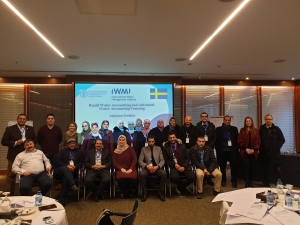
Using Water Accounting in the NENA region: Strengthening capacities in Jordan, Lebanon and Palestine
The Food and Agriculture Organization of the United Nations (FAO), in collaboration with International Water Management Institute (IWMI) and the national governmental organizations managing water resources in the participating countries, organized and successfully completed a training program for 40 participants in Jordan and Lebanon on Rapid and Advanced Water Accounting, as well as a national water accounting workshop in Palestine, where 40 participants attended. This activity falls within the project ‘Implementing the 2030 Agenda for water efficiency/productivity and water sustainability in NENA countries’, implemented by FAO with funding from the Swedish International Development Cooperation Agency.

